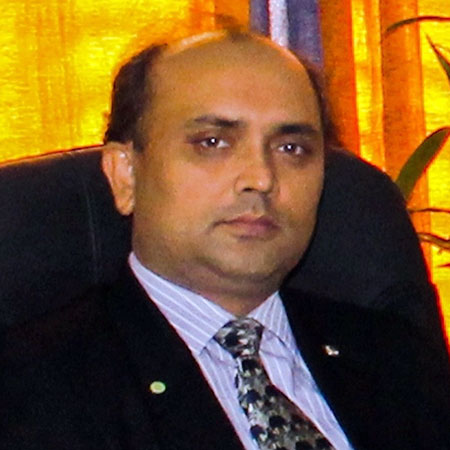Dr. Tofazzal Islam
Professor and DirectorBangabandhu Sheikh Mujibur Rahman Agricultural University, Kālīganj, Dhaka, Bangladesh
Highest Degree
Ph.D. in Biotechnology from Hokkaido University, Japan
Share this Profile
Highest Degree
Ph.D. in Biotechnology from Hokkaido University, Japan
Share this Profile
Dr. Md. Tofazzal Islam is a Professor and found Director of Institute of Biotechnology and Genetic Engineering (IBGE) of Bangabandhu Sheikh Mujibur Rahman Agricultural University (BSMRAU), Bangladesh. He obtained B Sc Ag (Hon) and M Sc (Ag) in Agricultural Chemistry from the Bangladesh Agricultural University (BAU), securing First Position in the First Class in both cases in order of merit. He went to Japan as a Japanese government scholar and did MS (1999) and PhD (2002) at Hokkaido University with distinction. He joined Bangladesh Open University as a lecturer in 1994 and became an Assistant Professor (1997), Associate Professor (2004) and Professor (2010). In July 1, 2010, he joined BSMRAU as a Professor in the Department of Biotechnology. He led the Department of Biotechnology as Head, launched MS and Ph D programs and established laboratories with state-of-art facilities from externally funded projects. He also served the BSMRAU as Director of International Affairs and Director of Outreach Activities. His current project funding is more than 1.0 million.
Prof. Islam is an internationally reputed natural products chemist and biotechnologist. He has made outstanding contributionsstanding how a phytopathogen specifically locates its host and proceed to infection mediated by the host-specific signals especially by the signaling compound. He discovered the activity and mode of actions of more than 60 novel secondary metabolites (new antibiotics) that inhibit motility of zoospores with potential for controlling oomycete phytopathogens. His contributions to understand molecular cross-talks between plants and oomycete phytopathogens and their biological control have been published in many international journals (>250 peer-reviewed articles, total citation, 3,800+ h index = 33, i10-index 89 on February 2021; Researchgate Score: 43+). He secured more than several million dollars of funding from World Bank, USDA, British Council (UK), BBSRC, Bangladesh Academy Science – USDA, University Grants Commission of Bangladesh etc. and established laboratories equipped with cutting-edge research in the field of biotechnology. Major foci of Prof. Islam’s laboratory include (i) discovery of bioactive natural products from plants and microorganisms; (ii) molecular biological studies on wheat blast fungus (BMC Biology 2016, 14:84) and mitigation of the fearsome wheat blast disease by development of blast resistant wheat varieties; (iii) molecular identification of multiple antibiotic resistant fish pathogenic Enterococcus faecalis and their control (Scientific Reports 2017, 7, 3747) (iv) discovery of probiotic bacteria (more than 600) from native environment and studies on their usage as growth promotion and disease suppression of hosts (Islam et al. 2016, Frontiers Microbiol., 7:851); (v) discovery of novel signaling and regulatory compounds against oomycetes (Mondol et al. 2017, J. Nat. Prod. 80:347-355; Dame et al., 2016, FEMS Microbiol. Lett., 16: 363; Mondol et al., 2015, J. Agric. Food Chem. 63:8777-86; Tareq et al., 2015, Bioorg Med Chem Lett., 25:3325-9; Talontsi et al., 2012 Phytochemistry 83:87-94); (vi) elucidation of involvement of protein kinase C and enhanced ATPase activity in mitochondria in zoosporogenesis and motility of zoospores (Islam et al., 2011, Mol. Plant-Microbe Interact. 24:38–947; Islam et al. 2016, Front. Microbiol. 7:1824); (vii) roles of dynamic rearrangement of F-actin and G protein-coupled receptor in chemotaxis and differentiation of zoospores by host-specific signals (Islam et al., 2003, Plant Soil, 101:131-142; Islam, 2008, Cell Mot. Cytoskel., 65:553–562); (viii) biological control of zoosporic oomycetes (Islam, 2008 Biol. Contr., 46: 312–321); (ix) development of sustainable strawberry production in Bangladesh (Scientific Reports, 2018, 8:2504); and (x) genomics and biotechnological studies on fearsome wheat blast fungus (BMC Biol. 2016, 14: 84; PLOS Biol. 2019, 17: e3000302).
Prof. Islam is an elected Fellow of the Bangladesh Academy of Sciences (FBAS). He was awarded many prizes and medals for his outstanding academic and research accomplishments in interdisciplinary research in the field of biotechnology. His notable awards include Bangladesh Academy of Science Gold Medal & Award 2011 in Biological Sciences (Senior Group), Food & Agriculture Award 2011 from Oxfam, CSRL and GROW, University Grants Commission (UGC) Bangladesh Awards in 2004 and 2008, the Best Young Scientist Award 2003 from the Japan Society for Bioscience, Biotechnology and Agrochemistry (JSBBA), Chancellor’s Prize in 1995 and a Gold Medal in 2003 from BAU. He presented research findings and chaired sessions in many international conferences/symposia in the USA, the UK, Germany, Japan, Italy, Netherlands, Hong Kong, Norway, Malaysia, China, South Korea, Fiji, and Jamaica. He served as an international consultant in many organizations including Secretariat of the Pacific Community (SPC) in the 22 Pacific Countries & Territories.
Dr. Islam worked as an Alexander von Humboldt fellow (2007-2009) at Georg-August-Universitaet Goettingen, Germany with Prof. Dr. Andreas von Tiedemann in the Division of Plant Pathology and Plant Protection. He has been awarded the Commonwealth Academic Staff Fellowship (March to May 2013) to work with Prof. Michele L. Clarke at the University of Nottingham, UK. He worked with Prof. Satoshi Tahara of Hokkaido University and Prof. Shinya Oba of Gifu University, Japan as a JSPS Postdoctoral (2003-2005) and JSPS Invitation Fellow (June-July 2015), respectively. Prof. Islam is the Chief Editor of Springer’s series CRISPR-Cas Methods and Bacillus and Agrobiotechnology. He has also been awarded the prestigious US Fulbright Visiting Fellowship (September 2017 to June 2018) to work on development of a convenient molecular diagnostic tool for diagnosing anthracnose diseases in asymptomatic strawberry plants with Prof. Daniel Panaccione at West Virginia University. He is a member of many national and international professional organizations including AAAS (USA), ASM (USA), APS (USA), National Core Committee for Biotechnology and so on. His current research focuses management of wheat blast by genome editing and other frontiersand mining Bangladesh biogold for promoting sustainable agriculture.
